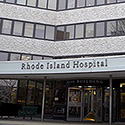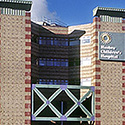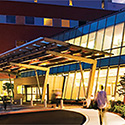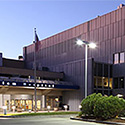Rotations
The faculty of The Warren Alpert Medical School’s Department of Dermatology is committed to offering a high-quality training program in dermatology.
Rotations
The faculty of The Warren Alpert Medical School’s Department of Dermatology is committed to offering a high-quality training program in dermatology.
Rotations at Brown Dermatology
Dermatology Resident Elective Time
Our senior residents, in good academic standing, are allowed 2-3 weeks to pursue an uninterrupted course of study or patient care at this or another institution, in the United States or abroad. This elective time allows the individual resident to expand knowledge in a particular subspecialty in dermatology such as pediatrics, surgery, international health, HIV-related disease, etc.
Medical Student Electives
During the four-week clinical dermatology elective, medical students will become familiar with common inflammatory and neoplastic dermatologic disorders. Each student will participate in the diagnosis and treatment of a wide variety of patients presenting with primary skin diseases.
Medical students may also be exposed to the study of cutaneous manifestations of systemic diseases while rotating through the outpatient clinics and inpatient consultation service. Students learn how to determine when appropriate referrals to dermatologists are necessary and become familiar with common dermatologic procedures including shave biopsy, punch biopsy, and cryotherapy.
Medical students will also present a dermatologic case of his/her choice to colleagues and at least one faculty member at the conclusion of the rotation.
For more information, please contact the residency coordinator, Erika Abou Kelila, by email or by phone at (401) 444-7139.
Resident Rotators
We welcome residents from other dermatology programs as well as Rhode Island Hospital residents pursuing training in Internal Medicine, Pediatrics, Family Practice, or other residency programs to come to our program for a four-week elective rotation. During the four-week clinical dermatology elective, residents acquire more knowledge of common inflammatory and neoplastic dermatologic disorders. Each resident will participate in the diagnosis and treatment of a wide variety of patients presenting with primary skin diseases.
Rotating residents may also be exposed to the study of cutaneous manifestations of systemic diseases while rotating through the outpatient clinics and inpatient consultation service. Residents learn how to determine when appropriate referrals to dermatologists are necessary and become familiar with common dermatologic procedures including shave biopsy, punch biopsy, and cryotherapy.
Rotating residents will also present a dermatologic case of his/her choice to colleagues and at least one faculty member at the conclusion of the rotation.
For more information, please contact the residency coordinator, Erika Abou Kelila, by email or by phone at (401) 444-7139.
To request shadowing, please complete this form.
Rotation Sites
Rhode Island Hospital
 Rhode Island Hospital is a 719-bed tertiary care center and is one of the largest and busiest teaching hospitals in New England. The hospital is the region’s trauma center and has nearly 150,000 emergency visits per year. There are residencies in nearly every ACGME specialty and numerous fellowships. At any one time, there are over 500 graduate trainees at Rhode Island Hospital.
Rhode Island Hospital is a 719-bed tertiary care center and is one of the largest and busiest teaching hospitals in New England. The hospital is the region’s trauma center and has nearly 150,000 emergency visits per year. There are residencies in nearly every ACGME specialty and numerous fellowships. At any one time, there are over 500 graduate trainees at Rhode Island Hospital.
Hasbro Children's Hospital
 Hasbro Children’s Hospital is the main pediatric teaching affiliate of the Warren Alpert Medical School of Brown University. It is the only children’s hospital serving Rhode Island, southeastern Massachusetts and eastern Connecticut. The hospital houses ambulatory clinics in virtually every pediatric subspecialty and has a very busy emergency service and surgical service. There is a large pediatric intensive care unit and three inpatient floors. The Pediatric Sedation Center is the site of the department’s pediatric vascular laser program. The hospital is the site of a large pediatric residency, a medicine-pediatrics residency, and a “triple board” residency in pediatrics-child psychiatry-psychiatry. Residents from these services do elective rotations in pediatric dermatology.
Hasbro Children’s Hospital is the main pediatric teaching affiliate of the Warren Alpert Medical School of Brown University. It is the only children’s hospital serving Rhode Island, southeastern Massachusetts and eastern Connecticut. The hospital houses ambulatory clinics in virtually every pediatric subspecialty and has a very busy emergency service and surgical service. There is a large pediatric intensive care unit and three inpatient floors. The Pediatric Sedation Center is the site of the department’s pediatric vascular laser program. The hospital is the site of a large pediatric residency, a medicine-pediatrics residency, and a “triple board” residency in pediatrics-child psychiatry-psychiatry. Residents from these services do elective rotations in pediatric dermatology.
Women & Infants Hospital
 The dermatology service provides inpatient consultation coverage for the obstetrical and gynecological services as well as the newborn nurseries and the Neonatal Intensive Care Unit. The new NICU has 80 beds, each housed in an individual room, and is the largest single-room nursery in the country. Women & Infants Hospital is the main OB/GYN teaching site for Brown’s medical school and has one of the busiest obstetrical services in New England.
The dermatology service provides inpatient consultation coverage for the obstetrical and gynecological services as well as the newborn nurseries and the Neonatal Intensive Care Unit. The new NICU has 80 beds, each housed in an individual room, and is the largest single-room nursery in the country. Women & Infants Hospital is the main OB/GYN teaching site for Brown’s medical school and has one of the busiest obstetrical services in New England.
Miriam Hospital
 The Miriam Hospital is a 247-bed teaching hospital which provides a broad range of primary, secondary, and tertiary care in a patient-friendly community setting on the East Side of Providence. The hospital has particular strengths and clinical focus in infectious disease, oncology, and cardiovascular disease. The range of clinical dermatology encompasses general dermatology, HIV-related dermatoses, and travel-associated dermatoses.
The Miriam Hospital is a 247-bed teaching hospital which provides a broad range of primary, secondary, and tertiary care in a patient-friendly community setting on the East Side of Providence. The hospital has particular strengths and clinical focus in infectious disease, oncology, and cardiovascular disease. The range of clinical dermatology encompasses general dermatology, HIV-related dermatoses, and travel-associated dermatoses.
Providence Veterans Affairs Medical Center
 As a leader in the development of the ambulatory care model in the VA system, the VA Medial Center in Providence provides dermatologic care in a very busy outpatient clinic. Providence has also been the pioneer teledermatology program in the VA system, providing continuous service to remotely located veterans since 1997. Residents and attendings staff the busy inpatient consultation service and the teledermatology clinic.
As a leader in the development of the ambulatory care model in the VA system, the VA Medial Center in Providence provides dermatologic care in a very busy outpatient clinic. Providence has also been the pioneer teledermatology program in the VA system, providing continuous service to remotely located veterans since 1997. Residents and attendings staff the busy inpatient consultation service and the teledermatology clinic.